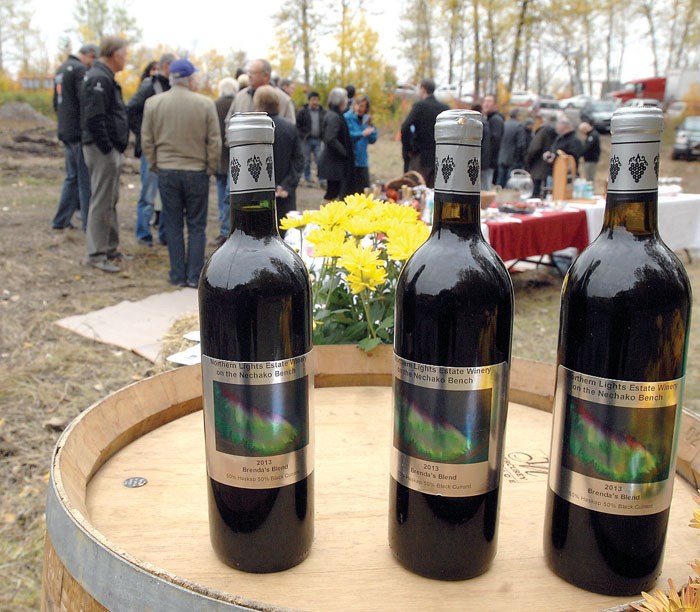Canada's most northerly winery, and Prince George's first commercial wine producer, has been launched. No bottles were smashed, but there were many clinks of glasses even though Northern Lights Estate Winery will not pour its own vino until 2015.
The business aspect of the winery was unveiled for the public. Senior partner Doug Bell pointed out the meaning of various construction areas on the 4.2-acre parcel of Nechako River property at the base of the cutbanks. The ground is being cleared and prepped for the main winery building and restaurant at the highest point of property, an amphitheatre, and a small orchard.
"In 2016 we will open a world-class restaurant featuring locally grown foods," he said.
Doug is only one of the Bells involved in the winery. His mother and father, Brenda and Pat, plus a number of shareholders are also participants. The Bells own the city's two Wendy's restaurants and have almost 25 years of local enterprise experience.
Pat Bell was also a longtime MLA and cabinet minister. As Minister of Agriculture he developed an interest in wine making, he said, and considered leaving the city when he ended his political career this past year, to settle in a warmer climate where grapes would grow. Something -in fact, someone - changed his mind.
"If there was a single catalyst for me it was [former school principal and city councillor] Don Bassermann," said the senior Bell. "The first fruit wine I ever tried was a Don's rhubarb wine."
Bell confessed he was reluctant to try a fruit wine, so used to grape wine was he. His focus on the grape was so strong that he and Brenda walked out of Bonaparte Bend Winery in Cache Creek when they stopped in on a whim and discovered all the bottles were fruit wine.
But just to be supportive, Bell purchased a local produce basket at a Spirit of the North Healthcare Foundation event. It was prepared by Bassermann and included a bottle of homemade rhubarb vino. Months went by with the wine in Bell's basement until, in a surge of obligation, he blew the dust off and popped the cork.
"I just loved it. I was so surprised by the taste and how it really was a wine. I had it in my head it would be different, don't ask me how, but Don's wine changed everything for me," said Bell. "After that, he would constantly show up on my doorstep with his latest creation. He deserves the credit for stimulating people's thoughts on what you can do with local agriculture, and fruit wines in particular, and I can honestly say I am one of them."
The Bells changed their plans. They had no wish to leave Prince George, so when their wine aspirations had a change of species, staying in their beloved city became elementary.
Bell called on his ministerial contacts - farmers and vintners. Brenda's family were not strangers to agriculture and hard work. They tapped knowledgeable friends on the shoulder for agri-smarts. They researched land and real estate. Eventually they found a sunbowl alongside the river, where the rich silt is six feet deep on top of a gravel base.
"Since we started clearing, many of the people out there have stopped in and talked to us," said Pat Bell. "It's a part of the city that has been long connected to agriculture. You've got the Wolczuk's Greenhouses and Nursery, [David Douglas Botanical Garden Society's] Anne Martin lived up the road, there was once mushroom farm around here, the more research we do the more we find out. It's got its own micro-climate, great soil conditions - we hope to be a catalyst to return this unique part of Prince George to agricultural prominence right inside the city."
Lheidli T'enneh First Nation elder Frank Frederick said the history of food gathering goes back longer than just pioneer farmers.
"This used to be a berry-picking area and fishing for salmon down along the river," Frederick said. Indeed the hillside was thriving with the red leaves of wild cranberries and the riverfront sprinkled with saskatoons.
"Maybe Pat could make some salmon wine," Frederick laughed, then added more seriously, "We [Lheidli T'enneh people] are behind you 100 per cent."
Bell said the saskatoons might end up fermenting in a bottle. That is part of the family's plans to experiment with different recipes. On the definite agenda is apple, rhubarb and gooseberry for whites plus black currant, honeyberry and raspberry on the red side. At the peak of production, they expect to produce about 24,000 bottles per year.
First, they have to build the structures, drill the well, and plant the 2,198 trees and shrubs they will need (they expect to intake some other growers' fruits as well).
"By 2015 you'll be able to buy a nice bottle of wine right here," said Doug Bell. "We will have you all back here again that May or June for our grand opening."
For the purposes of celebrating the launch of the business operations, and give visiting friends and dignitaries an idea of what to expect, the Bells had an array of fruit wine to be sampled. All of it came, as if raising a glass to kizmet itself, from Bonaparte Bend Winery.



